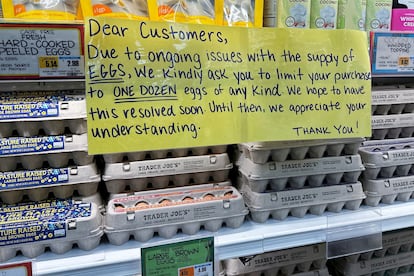The price of eggs will rise by 41% this year in the United States, according to official forecasts


Not only are the prices of eggs still sky-high in the United States, they are set to rise even further. Supply problems caused by bird flu have created an imbalance in the market that has driven up the price. A report released Wednesday by the Department of Agriculture's Economic Analysis Service estimates that prices will rise 41 percent this year. The price hike has caused some restaurant chains to charge extra for each egg. There have also been some isolated problems with shortages. The average price for a dozen hit a record $4.95 in January, but in many supermarkets that figure is double that and in some places the price of an egg exceeds a dollar.
Retail egg prices rose nearly 15% in January, after rising another 8% in December. According to the USDA and official statistics, egg prices were 53% higher in January than in January 2024 and exceeded previous highs set in January 2023. “Egg prices are projected to increase 41.1% in 2025, with a forecast range of 15.0% to 74.9%,” the USDA report under the Trump administration says.
The price increases are due to an outbreak of highly pathogenic avian influenza that began in 2022, which has been reduced. Highly pathogenic avian influenza contributes to higher egg prices by reducing laying hen populations and egg production. About 18.8 million commercial layers were affected by avian influenza in January 2025, the highest monthly total since the outbreak began in 2022, according to the Department of Agriculture. And the number has already risen to more than 30 million through February.
Prices have more than doubled since before the outbreak began, costing consumers at least $1.4 billion last year, according to an estimate by agricultural economists at the University of Arkansas. Restaurants like Denny's and Waffle House began adding surcharges to egg dishes.
New shock planTrump's new Agriculture Secretary Brooke Rollins published an article in The Wall Street Journal on Wednesday announcing a plan to address high egg prices that includes studying imports from other countries.
“The USDA will invest up to $1 billion to stem this crisis and make eggs affordable again,” Rollins said. The USDA has already dedicated about $2 billion starting in 2022 to combat avian flu.
Rollins says he is working with the Department of Government Efficiency (DOGE) overseen by billionaire Elon Musk to cut hundreds of unnecessary expenses and put the money toward fighting bird flu. Some associations have warned that DOGE-driven layoffs have occurred precisely among those tasked with fighting the epidemic, which has led to the culling of some 166 million egg-laying hens since 2022. Democratic Senator Amy Klobuchar called on the Department of Agriculture to confirm that it has rehired all people involved in the bird flu response who were laid off.
“There is no silver bullet to eradicate bird flu,” Rollins admits, who presents a five-point strategy. The first consists of up to $500 million in aid to poultry producers to implement biosecurity measures and prevent any contamination. The second consists of up to $400 million in aid to farmers whose populations are affected by bird flu to safely resume their operations after an outbreak. In addition, the Department of Agriculture will allocate up to $100 million to research and development of vaccines and treatments to improve their effectiveness and efficiency against bird flu.
Fourth, Rollins wants to remove regulatory burdens for egg producers and “make it easier for families to raise chickens in their backyards.” Finally, the Trump administration will consider import options to reduce egg costs in the short term. “We will proceed with imports only if the eggs meet strict U.S. safety standards and if we determine that doing so will not jeopardize U.S. farmers’ access to markets in the future,” she said.
The administration is in talks to import 70 million to 100 million eggs from abroad in the coming months, Rollins said. But 7.57 billion eggs were produced in the United States last month, so those imports don't seem likely to make a significant difference in the market.
EL PAÍS






